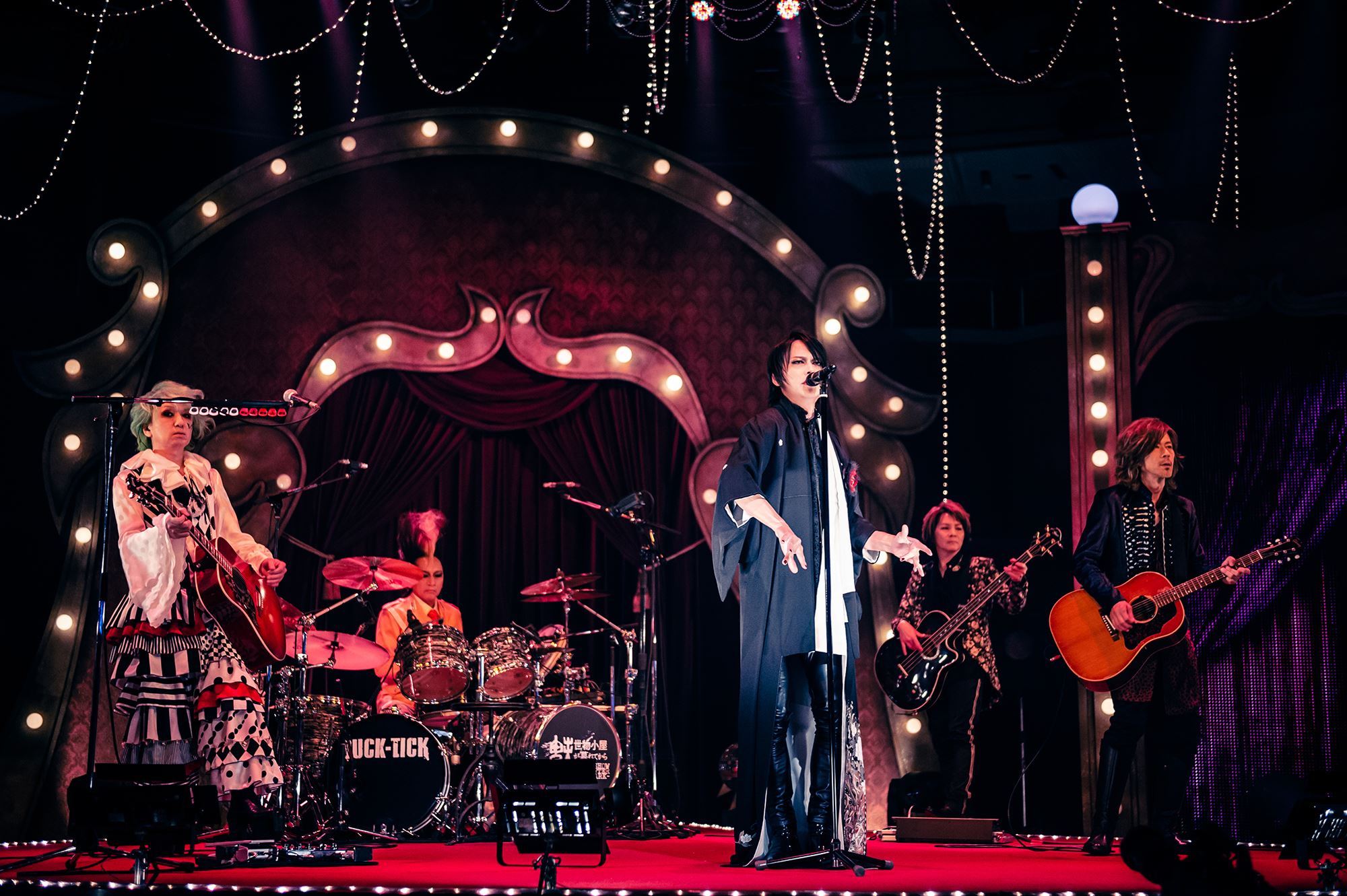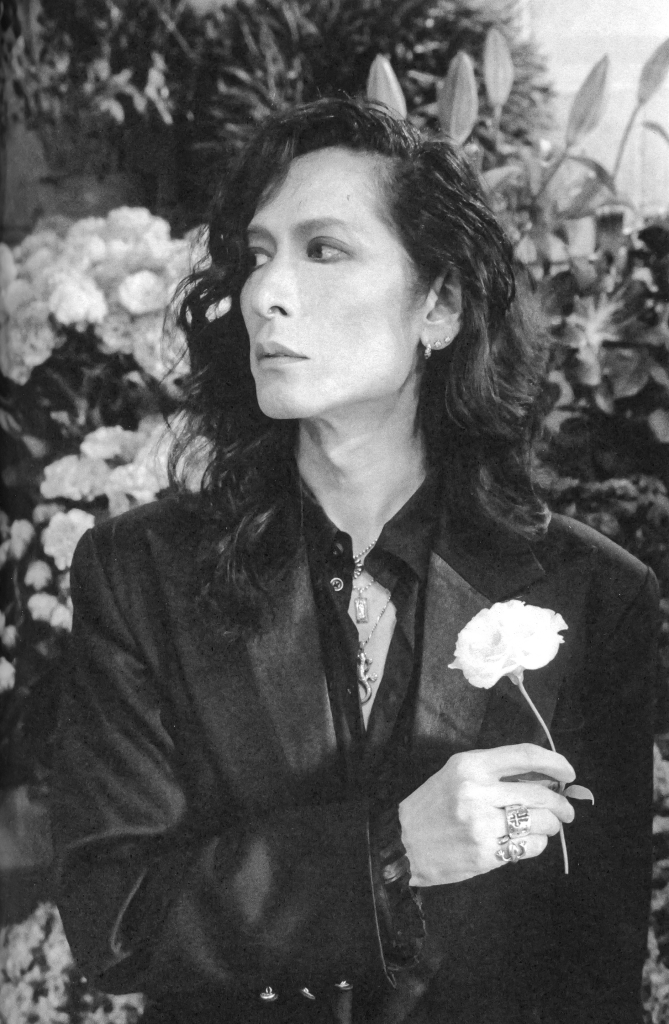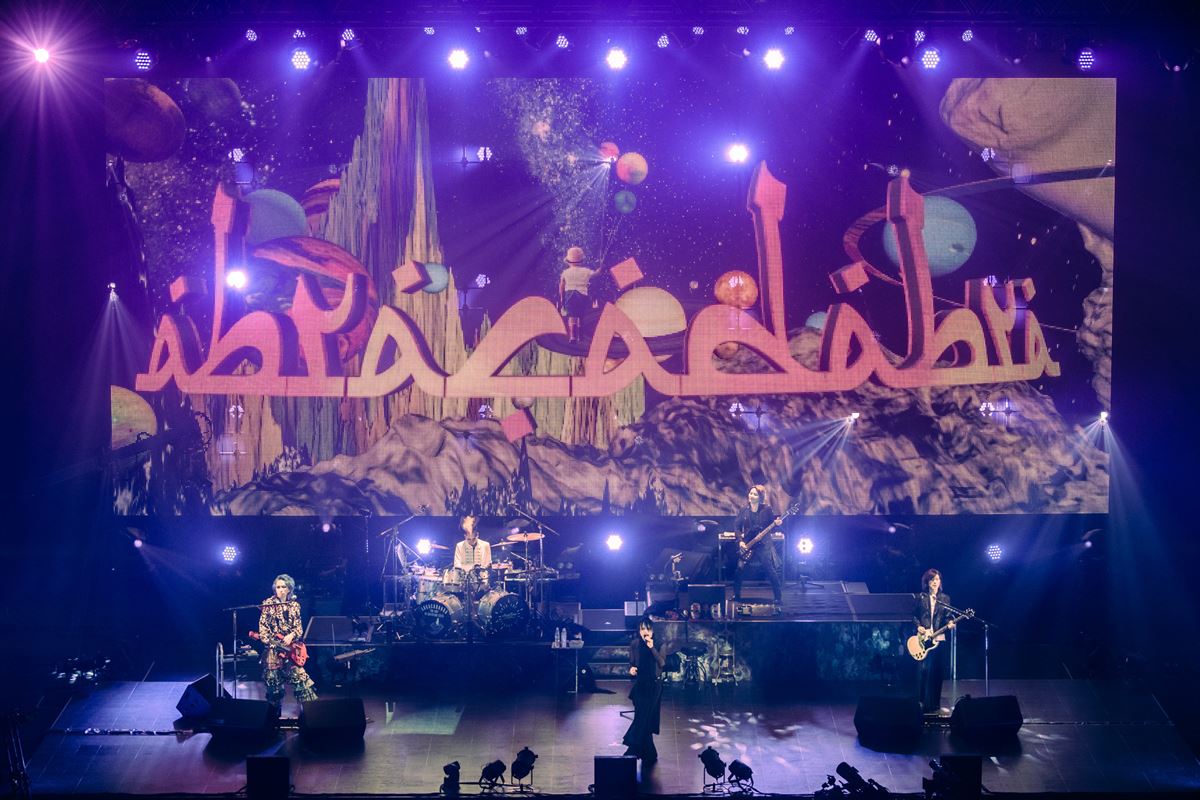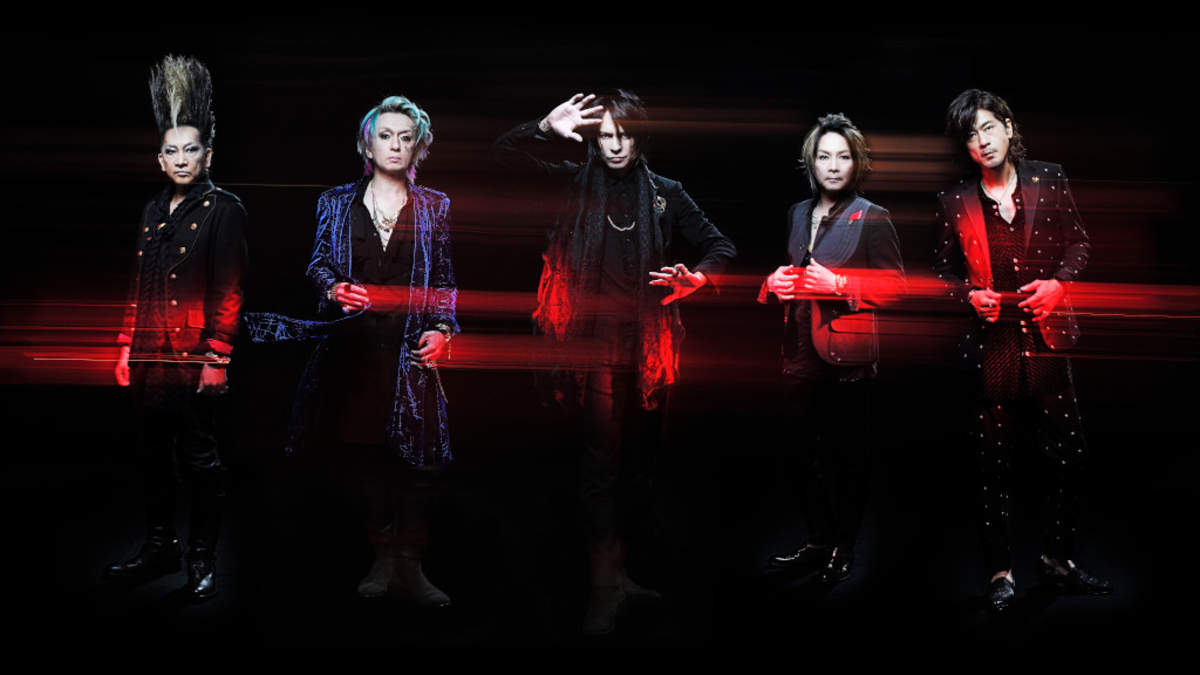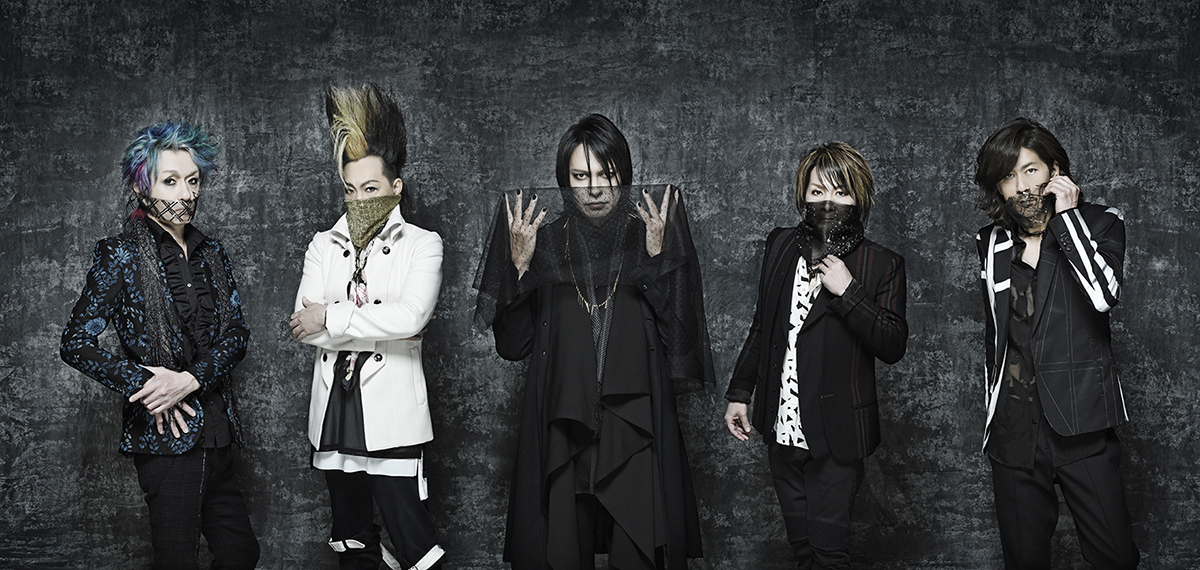ーー Vague (lol).
I: See, MAHITO was originally a bassist but switched to being a keyboardist halfway through. I believe he’s been playing the keyboard since he was a child so he can even play classical music, but I think the genre he was into at the time was techno. I liked Roxy Music³³ so that was where we got along. MAYUMI was a mysterious guy who played unbelievable drums (lol). He’d have a ridiculous number of tom toms set up too. I think he probably liked the drummer Terry Bozzio³⁴ so he might’ve been influenced by him. So, you know, I think he probably listened to Frank Zappa³⁵, for sure, and Missing Persons³⁶ and the sort of pop genre music. Him and HAL, they liked progressive rock so they talked a lot in that area. And, then there’s HIKARU who listened to a wide range of music; anything from jazz to punk to hard rock and everything in between.
ーー Even your music preferences were all over the place; they don’t really come together (lol).
I: But you see, that’s because it was the new wave era; the time when techniques of combining musical genres were established. As my words suggest, we mix a bunch of things together to acquire new techniques which we then try to apply to old music to create something new altogether. From this perspective, I think that DER ZIBET’s experimental nature fit right into that era. That was the strategy of our record label back then; to put that sort of DER ZIBET out just as we were to make it look a little more upscale, y’know?
ーー Did you ever produce any demo tapes prior to your debut?
I: We did. We had actually been scouted by another record label and we worked with that label to the point of recording a demo tape, but for one reason or another, all of us, the band members felt that it would probably take us quite some time before we could actually debut if we stuck with that label. So we took the demo tape we recorded there and brought it to Sixty Records (lol). Aren’t we such an ungrateful bunch (lol).
ーー (Lol). Was the very first release of DER ZIBET’s debut like the culmination of everything you’ve been doing up till then?
I: Yeah.
ーー Did the relationship between ISSAY-san and your family change at that time?
I: Once I said, “Well, I’m going to have my debut,” they gave up, y’know. Up until that point, they kept saying all sorts of things like, “Music is just a thing you’re doing as a hobby,” or that they wouldn’t send me any allowance if I didn’t go back during the summer vacations, and all that. So that’s why no one had anything to say when I managed to make my debut in the middle of my university education.
ーー It’s great that your debut went without a hitch.
I: Or rather, it was probably more like a form of recognition that I’m finally making my move. Ever since that incident in high school, the way I looked at things had changed drastically, and that’s why I think that my life only truly started at age 17. The person I was prior to that and after that are… How should I put this…… I guess you could say that to me, there’s a severance between them. Everything changed when I was 17. How I thought about things, the way I looked at them, everything. At the same time, that was also when I established my own view of my life, things like my reason for living, you know. And that’s why, even now, the very first question I’d ask myself when considering something is, “What would I think about this if I were my 17-year-old self?” Because to me, that incident which happened when I was 17 was my personal test of faith³⁷.
My parents secretly came to watch my show. I think this father of mine who I so feared had been supporting me in the shadows until the end of his life.
ーー Hmn. So how were things after going pro?
I: It was uncharted grounds, but while we didn’t know anything, I think we had some sort of unfounded confidence (lol). Because I hadn’t really watched all that many people performing live before at the time. And besides, even music, I started doing it only because of my own wilful idea that it was something I could do if I did it that particular way. So it was only of course that prior to debuting, I didn’t even know what it entailed. Neither did I have any background knowledge at all. If, back then, I knew that this is the kind of music that would be popular in today’s world, that Japan’s music industry would end up in this state… If I knew these sorts of things, I would’ve probably chosen not to do music. You know, I think I could do it only because I didn’t know things.
ーー But even if you didn’t know, wasn’t it huge to ISSAY-san that you got to a place where you could make music you wanted to make?
I: Yeah. Because I thought I’d probably die if I couldn’t do music.
ーー Huh!?
I: Because even if I couldn’t make music for a living and had to earn money and feed myself with part-time jobs or whatever, it was fine with me. Above all, I felt that if I ever got myself into a situation where I couldn’t put all of myself into music, I’d be as good as gone.
ーー You believed so strongly that music was all you had.
I: Yeah.
ーー That you wanted to give your life to what you love.
I: Is it something I love? That’s something I ask myself even now… Although, there must be something about it that suits my personality if someone as fickle as I am has kept at it for as long as I have (lol). But have I been doing this because I love it? On this point, I said that I didn’t particularly enjoy singing by nature. And that I absolutely hated singing in front of people.
ーー Mm… If that’s the case, then it makes me wonder all the more, why music?
I: I suppose, maybe it’s because the first time I stood on stage was the very first time in my life when I was called “cool” instead of “gross”.
ーー You were called words like gross?
I: Well, it’s gross, isn’t it, for a male to wear makeup on the regular. Back in those days.
ーー Huh, you wore makeup regularly?
I: Yeah, in high school. Although, as you might expect, I didn’t wear it all the time in my high school days. Since, you know, my parents could see me.
ーー What led to that?
I: It wasn’t that I wanted to be a woman, or that I wanted to be perceived as a woman so much that I started wearing makeup or anything like that. I forgot what started it, but I got into an argument with a friend when I was in junior high. And it was then when he said, “You queer bastard³⁸!” But I didn’t understand the reason behind why he called me that. Like, on what basis was he calling me that? So I asked him back, “What do you mean by that?” and he said, “You’re so much like a girl that it’s gross!” All I thought was, oh, I see. That turned into a preoccupation of mine for the longest time. So after that, sometime after I started high school, a thought crossed my mind, y’know, that, “If I really am that feminine, then I’d probably look good with makeup. And since that’s the case, then I should wear makeup. No one’s going to have anything to complain about if I wear makeup anyway.” And so, I started wearing makeup similar to how it is now. I have been ever since I was a high schooler.
ーー Even when you went to school?
I: That’s right. They thought I had mental problems at the time (lol), so my teachers didn’t say anything either. When we were doing push-ups during phys ed, the teacher saw my nails and asked, “What’s this?” so I answered, “Manicure,” and to that, he said, “You’re into that sort of thing?” It’d be too troublesome for me to explain properly right there and then, so I just replied with, “Yes.” And he said, “I see.” And that was it (lol).
ーー (Lol).
I: After that, the phys ed teacher called my friend, like, “Hey, come here,” and then asked him, “That kid’s a little different, isn’t he? Doesn’t he seem a bit like That (gay)?” And I think my friend answered with, “Yeah, he does. He seems to be kind of That.” (Lol).
ーー You weren’t bothered by the reactions of the people around you?
I: People who walk past would often do a double-take, but (lol) I thought that compared to forcing myself to hunch and walk around like a guy in a sorry state, this was far better, wearing makeup and walking tall with my chest out.
ーー It’s cooler to wear makeup the way you like it and walk around proudly.
I: I didn’t exactly wear makeup because I liked it, though… Ah, I guess I did like it (lol).
ーー I don’t think you’d wear makeup you didn’t like (lol).
I: Yeah, I wouldn’t (lol). But really, getting called a queer bastard really shocked me.
ーー I wonder if it’s because you were mild-mannered? Like sticking out your pinky finger?
I: No, no (lol). But, well, with the way my face looks and how my body is shaped like this.
ーー To ISSAY-san back then, wasn’t that the highest form of insult in the limited vocabulary of a junior high schooler?
I: Probably. Well, but when we look at the generations who came later, I think I’m the one who won, though (lol). Now, even if high school boys wear makeup, people would think that they’re trying to look cool and that’s the end of it, right? (Lol).
ーー That’s true.
I: So, going back to the topic at hand, this me who seems to be like That (lol) was called cool for the first time when I stood on stage just the way I was, and that’s why I thought, music is what I should be doing. Things happened as usual in my daily life, though. During DER ZIBET’s Kyushu tour, I crashed³⁹ at a relative’s house for a night and went drinking with my uncle when his friends saw me looking the way I was. It turned out those people mistook me for my uncle’s paramour (lol). Because at the time, I was blond and the locks at my nape were long. That was a story I heard at my father’s funeral.
ーー Your father, he’d passed away?
I: Right around HOMO DEMENS (1990). He was a father I feared but he never said anything more after I made my debut, y’know, since I’m earning my own money and feeding myself. And it was only later on that I also heard that he apparently snuck over to watch my show (lol). They said he secretly came to my show at Shibuya Public Hall⁴⁰, him and my mother, together.
ーー I guess it’s because of your father’s pride that he did it in secret.
I: Perhaps… Although, he did say, “That was amazing. It was so loud it felt like my insides were getting torn out.” (Lol). Then when I asked my mother, “Did you come and watch?”, she said, “I certainly did.” (Lol). Our family’s really quite formal and reserved with each other so that’s about it. I’m going a little off topic, but my alcohol-loving father got affected with liver disease so he stopped drinking ever since I was in high school. But we didn’t think he was going to die yet at the time, y’know. So, one day when I was in my final year of high school, my father called me to his room. I was apprehensive, thinking in the back of my mind, “What could it be? Is he going to get angry and hit me again?” but instead, he said, “There’s a liquor called 〇〇〇〇 on the first floor. Bring it here.” After I went and brought it back, he said, “Fill this glass,” so I did, and then he said, “Drink,” so I drank. Then he said, “This is expensive stuff so taste it and drink,” so I drank it bit by bit, but then he said, “How would you know the taste of the liquor when you sip like that!!”, so I downed it all in one gulp and slammed the glass on the table. Then he said, “Good, you, me and your mother will finish this bottle today.” The bottle I just opened was brandy, so I drank, thinking I’ll be fine since both my parents will be drinking too, but before I knew it, my father was drinking shochu and my mother was drinking whiskey (lol). In the end, I emptied that bottle of brandy on my own, in one night (lol).
ーー Strong (lol). It sounded as if there was something your father wanted to say.
I: Maybe he wanted to drink with me at least once because he knew that he’d never be able to drink with me again for the rest of his life…… was what I only realised later. Because it never happened before and never happened again, so that was the one and only time…
ーー Ah…
I: Even after that, there were times when my father had to go to Tokyo for get-togethers⁴¹ because of work. On those occasions, he’d tell me, “Come pick me up,” and I would go and pick him up, though. Just so that he could use the excuse, “I have to go because my son has come to pick me up”. But it doesn’t make sense that someone looking like this picks him up, right? My father’s friends all made a huge fuss, y’know (lol). Like, “What’s up with you?” (lol).
ーー I’d expect that (lol). Could it be that he wanted to show off a little bit too?
I: Nah, there’s nothing to be proud of, is there? A guy like me.
ーー No way, you’ve made your debut, released CDs, performed live shows; even if he didn’t say it directly, I’m very sure he was proud of you.
I: Who knows, really? Although, I do think that he was supportive of me. With those circumstances, I was prepared to watch this person who I so feared as a child grow weaker and weaker so…… I didn’t feel anything special but… Mmm…… I didn’t see him die, y’know. When I got home and turned on my answering machine, message after message after message was recorded from the moment he fell into critical condition until he passed and I rushed back to my parents’ home as fast as I could but…… I think there were 2 times when I cried. Once was when I visited him in the hospital and I saw him struggling desperately, trying to get up even though he couldn’t. I guess my father wanted to show his dignity… That manly spirit⁴² made me cry, and after that was when my father died, and I arrived at my parents’ home and saw my father’s corpse. When I went back into my room, the tears came. Why did I cry? I have absolutely no clue, though. During the funeral, I had a lot of trouble because I had extensions in my hair which made it so long that it reached my ankles, y’know. Even though my mother was already peeved when I visited my father at the hospital with that hair, I still showed up at his funeral with it so she was half-mad with rage, scolding me, “I can’t believe you dare show up with that head.” She gave me the silent treatment for a good half year after that (lol). But it wasn’t as if I could do anything about it, you know? It took 2 people 20 hours a day over more than 3 days to do that, I couldn’t take it off just like that. My mother was angry at me the whole time, saying things like, “Look at you, coming home dressed like that altar⁴³,” but when my father’s magnificent-looking altar was brought to the house, she turned to the craftsman, pointed at my head and said, “My, that’s splendid. Gold leaf pasted on black lacquer, just the way my son likes it, don’t you think? Look at this head of his.” (Lol). Though, as you’d expect, that struck a nerve at the time (lol).
ーー (Lol).
I: That’s how my mother was, but a year after my father passed away, I began sending my mother flowers every year on her birthday. It’s like, part of it is letting her know that I love her. Because, although she’s my stepmother, I’ve been with her longer than with my biological mother. I think that she really took care of me and brought me up well. So I really have to take my hat off to her for that, y’know.
ーー From a mother’s standpoint, I think you’d have been considered as a difficult child. You were sensitive and a bit of an oddball.
I: And to top it off, my feelings of being victimised were all out on full display (lol). I guess she probably had a really hard time. Furthermore, she hadn’t had any kids yet when she became my mother too. So considering that she suddenly had to become a mother to a 9 or 10 year-old boy, I think it’s understandable that she wouldn’t have any idea how to raise a child. There was once when she got mad angry at me when I went home after playing in mud near the house (lol). So, I thought, “Ah, I can’t play in the mud if I’m living with this person,” and since then, I never played with mud ever again.
pic
ーー You were thoughtful even as a child.
I: Well, that’s of course. Because, you see, she’s looking out for me too from her end. But, you know, we get along well now. Sometimes, when I take my mother out for a meal or something, the madam⁴⁴ there would even say, “Why, you look just like your mother.⁴⁵” It appears that somehow, we give off similar vibes.
ーー Do you look alike too?
I: Our facial features are similar too, in the sense that there’s this air of some unknown foreign ancestry or something like that (lol). I’ve been to that place together with my younger brother and my mother too, but on that occasion, the madam commented, “The younger brother looks like the father, but the older brother looks exactly like the mother, doesn’t he?” and both of us could only laugh helplessly with troubled expressions (lol).
ーー Could it be that your mother’s facial features were your father’s type?
I: You know, that’s what I thought in the beginning too. But if my mother’s face was my father’s type, then it begs the most disturbing question of, “Does that mean my face, which resembles my mothers’, is also my father’s type?” (Lol). But after giving it a lot of thought, and comparing my biological mother and my stepmother, they don’t look much like each other though (lol).
I used to quarrel with HIKARU a lot, though, now we joke about it.
I guess we couldn’t understand or accept each other when we were young.
ーー (Lol). Going back to what you said, it sounds difficult to live with extensions so long that they reach your ankles.
I: It was super hard to deal with in daily life. I had to be extremely cautious because it’s dangerous when I board taxis or get on escalators and elevators. Because if my hair gets caught between the doors, it’s the end. You know, I’ve even been chased by elementary schoolers when I’m walking along the streets (lol). They’d be yelling, “What’s that? Look at that guy!” and come running towards me from 20 meters away, and when I realise it and turn around, they’d all stop (lol). It’s like, are we playing “Red light, Green light⁴⁶”? (Lol). Also, when I went to a friend’s house, their kitten kept playing with it so excitedly, y’know. When I said, “Right, I’m going home,” and stood up to leave, there was this weight pulling at my head and when I turned to see what it was, I found the kitten dangling from my hair (lol).
ーー (Lol). Right at the time when you had those extensions for that album HOMO DEMENS, it caused quite a stir in the editorial department I worked in back then. That picture on the album cover where you looked like you were breaking out of a shell made a huge impression.
I: That husk of mine (lol) was made by pouring resin in a mould of me which took a day to make and cast from my head to my toes so it was a lot of work. You know, I think the person who made it didn’t think that they were doing something bizarre though. The idea got presented, and it sounded interesting so we just did it. Although, I wonder what the other band members thought of it…? (Lol).
ーー I suppose the members’ reactions were rather dry?
I: Yeah, quite. Logically they understand that this is how I naturally am, but… Maybe that’s precisely it? You know, I do think there are times when I don’t really feel like wearing makeup, things like that. Back then, if you look at us as a whole, everyone was absurdly dressed, so (lol).
